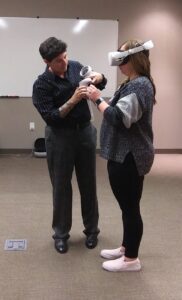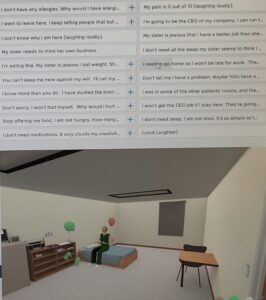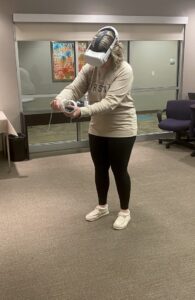BTC Embraces Innovative VR Tech in Simulations
Posted on April 28, 2023
Nursing is a demanding profession that requires continuous education and training to keep up with the latest developments in patient care. Traditional training methods can be time-consuming, expensive, and sometimes impractical for colleges. However, thanks to advances in technology, virtual reality (VR) is becoming an increasingly popular tool for training healthcare professionals.
VR training uses computer-generated simulations to recreate real-life scenarios, allowing learners to practice and perfect their skills in a safe, controlled environment. This technology has already been successfully used in other industries, such as aviation and the military; now, it is making its way into the healthcare sector. The VR system provides learners with realistic scenarios and challenges that they would face in a real-life healthcare setting.

We are proud to partner with Elsevier, a leading provider of healthcare information solutions, to purchase Elsevier’s Virtual Reality platform for use in their nursing programs. Recently, Elsevier came to Bolivar Technical College to introduce their virtual reality training system to their nursing instructors.
During the training session, our faculty members were given hands-on experience in using the VR headset and hand controls to assist a virtual diabetic patient. The simulation provided a realistic environment where they could measure medications, check heart and lung sounds with a stethoscope and give an injection. The trainer was able to monitor the trainee’s progress while in the same room through a computer screen that showed what the trainee was seeing and doing in the virtual environment. This allowed the trainer to guide the trainee through the nursing scenario, providing immediate feedback and guidance as needed.
To paint a picture of what was happening in the training room, Erin Mock, Director of Nursing Education at BTC, explained to staff members on the other side of the window, "That is the patient, so she's probably listening to him. One of the first things you can do is pick up a stethoscope and listen to his chest. His bed is right there and she's standing at the side of his bed right now. There's a med[icine] cabinet over here and she's probably opening the drawers. They're giving him insulin, so when she's pulling up, she's probably drawing the insulin. You can put oxygen on him, you can talk to him, and his wife is also present."
The VR training system’s interactive and immersive nature enabled the trainees to practice critical thinking and decision-making skills, making it an effective tool for nursing education. It covers a wide range of scenarios, including patient assessments, wound care, medication administration and infection control. The simulations are designed to be realistic and immersive, providing learners with a sense of presence in the virtual environment.
Lucinda Schmidt, BTC Simulation & Skills Center Coordinator, explains, “VR brings new experiences and opportunities to our students at the touch of a button. I can select a scenario for students to immerse themselves in that will help to bring their classroom lectures to life— or provide a simulation for those that are having trouble with a skill or topic to make those connections and feel empowered when they are caring for real patients. This will be a beneficial tool to add to our programs and I am excited for all the possibilities to come.”
Using VR technology, nursing students at BTC can practice critical thinking, decision-making, and communication skills in a risk-free environment. The system also allows for immediate feedback and assessment, providing students with an opportunity to learn from their mistakes and improve their performance.
Elsevier’s VR training system is an innovative way of teaching and learning, and it has the potential to revolutionize the way nursing education is delivered. By providing learners with a safe, controlled environment to practice their skills, VR training can help to improve patient outcomes and reduce medical errors.
Mrs. Mock states, "Bolivar Technical College uses all available technologies and resources to ensure that we are on the cutting edge of nursing education."

In conclusion, virtual reality training is an exciting development in nursing education, and its potential benefits are vast. By partnering with Elsevier, BTC is at the forefront of this technology, providing our nursing students with the latest tools and resources to succeed in their profession. The future of nursing education looks bright, with virtual reality training leading the way!
